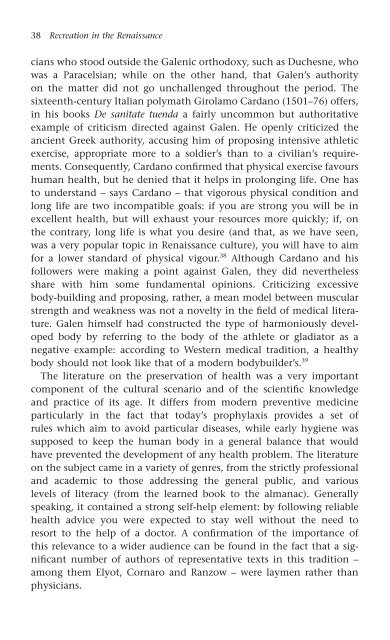Recreation in the Renaissance
Recreation in the Renaissance
Recreation in the Renaissance
- No tags were found...
You also want an ePaper? Increase the reach of your titles
YUMPU automatically turns print PDFs into web optimized ePapers that Google loves.
38 <strong>Recreation</strong> <strong>in</strong> <strong>the</strong> <strong>Renaissance</strong><br />
cians who stood outside <strong>the</strong> Galenic orthodoxy, such as Duchesne, who<br />
was a Paracelsian; while on <strong>the</strong> o<strong>the</strong>r hand, that Galen’s authority<br />
on <strong>the</strong> matter did not go unchallenged throughout <strong>the</strong> period. The<br />
sixteenth-century Italian polymath Girolamo Cardano (1501–76) offers,<br />
<strong>in</strong> his books De sanitate tuenda a fairly uncommon but authoritative<br />
example of criticism directed aga<strong>in</strong>st Galen. He openly criticized <strong>the</strong><br />
ancient Greek authority, accus<strong>in</strong>g him of propos<strong>in</strong>g <strong>in</strong>tensive athletic<br />
exercise, appropriate more to a soldier’s than to a civilian’s requirements.<br />
Consequently, Cardano confirmed that physical exercise favours<br />
human health, but he denied that it helps <strong>in</strong> prolong<strong>in</strong>g life. One has<br />
to understand – says Cardano – that vigorous physical condition and<br />
long life are two <strong>in</strong>compatible goals: if you are strong you will be <strong>in</strong><br />
excellent health, but will exhaust your resources more quickly; if, on<br />
<strong>the</strong> contrary, long life is what you desire (and that, as we have seen,<br />
was a very popular topic <strong>in</strong> <strong>Renaissance</strong> culture), you will have to aim<br />
for a lower standard of physical vigour. 38 Although Cardano and his<br />
followers were mak<strong>in</strong>g a po<strong>in</strong>t aga<strong>in</strong>st Galen, <strong>the</strong>y did never<strong>the</strong>less<br />
share with him some fundamental op<strong>in</strong>ions. Criticiz<strong>in</strong>g excessive<br />
body-build<strong>in</strong>g and propos<strong>in</strong>g, ra<strong>the</strong>r, a mean model between muscular<br />
strength and weakness was not a novelty <strong>in</strong> <strong>the</strong> field of medical literature.<br />
Galen himself had constructed <strong>the</strong> type of harmoniously developed<br />
body by referr<strong>in</strong>g to <strong>the</strong> body of <strong>the</strong> athlete or gladiator as a<br />
negative example: accord<strong>in</strong>g to Western medical tradition, a healthy<br />
body should not look like that of a modern bodybuilder’s. 39<br />
The literature on <strong>the</strong> preservation of health was a very important<br />
component of <strong>the</strong> cultural scenario and of <strong>the</strong> scientific knowledge<br />
and practice of its age. It differs from modern preventive medic<strong>in</strong>e<br />
particularly <strong>in</strong> <strong>the</strong> fact that today’s prophylaxis provides a set of<br />
rules which aim to avoid particular diseases, while early hygiene was<br />
supposed to keep <strong>the</strong> human body <strong>in</strong> a general balance that would<br />
have prevented <strong>the</strong> development of any health problem. The literature<br />
on <strong>the</strong> subject came <strong>in</strong> a variety of genres, from <strong>the</strong> strictly professional<br />
and academic to those address<strong>in</strong>g <strong>the</strong> general public, and various<br />
levels of literacy (from <strong>the</strong> learned book to <strong>the</strong> almanac). Generally<br />
speak<strong>in</strong>g, it conta<strong>in</strong>ed a strong self-help element: by follow<strong>in</strong>g reliable<br />
health advice you were expected to stay well without <strong>the</strong> need to<br />
resort to <strong>the</strong> help of a doctor. A confirmation of <strong>the</strong> importance of<br />
this relevance to a wider audience can be found <strong>in</strong> <strong>the</strong> fact that a significant<br />
number of authors of representative texts <strong>in</strong> this tradition –<br />
among <strong>the</strong>m Elyot, Cornaro and Ranzow – were laymen ra<strong>the</strong>r than<br />
physicians.










